Principles and Practices in Health and Social Care: A Report
VerifiedAdded on 2020/02/05
|14
|4944
|28
Report
AI Summary
This report delves into the core principles of health and social care, examining various aspects such as the principles of support applicable in care settings, particularly focusing on the needs of individuals with mental health issues like Mr. Bob. It outlines procedures for protecting clients, patients, and colleagues from harm, emphasizing risk assessment, communication, and the importance of interpersonal working. The report also addresses ethical dilemmas that arise in healthcare, using the case of Mrs. Helen to explore conflicts between medical advice and personal beliefs. Furthermore, it analyzes the implementation of policies, legislation, and codes of practice, highlighting the impact of these on organizational policy and practice, and the development of local policies in accordance with national guidelines. Theories that accentuate health and social care practice and the impact of social processes on service users are also discussed, providing a comprehensive overview of the subject. The report concludes with a summary of key findings, emphasizing the importance of ethical considerations and person-centered care.
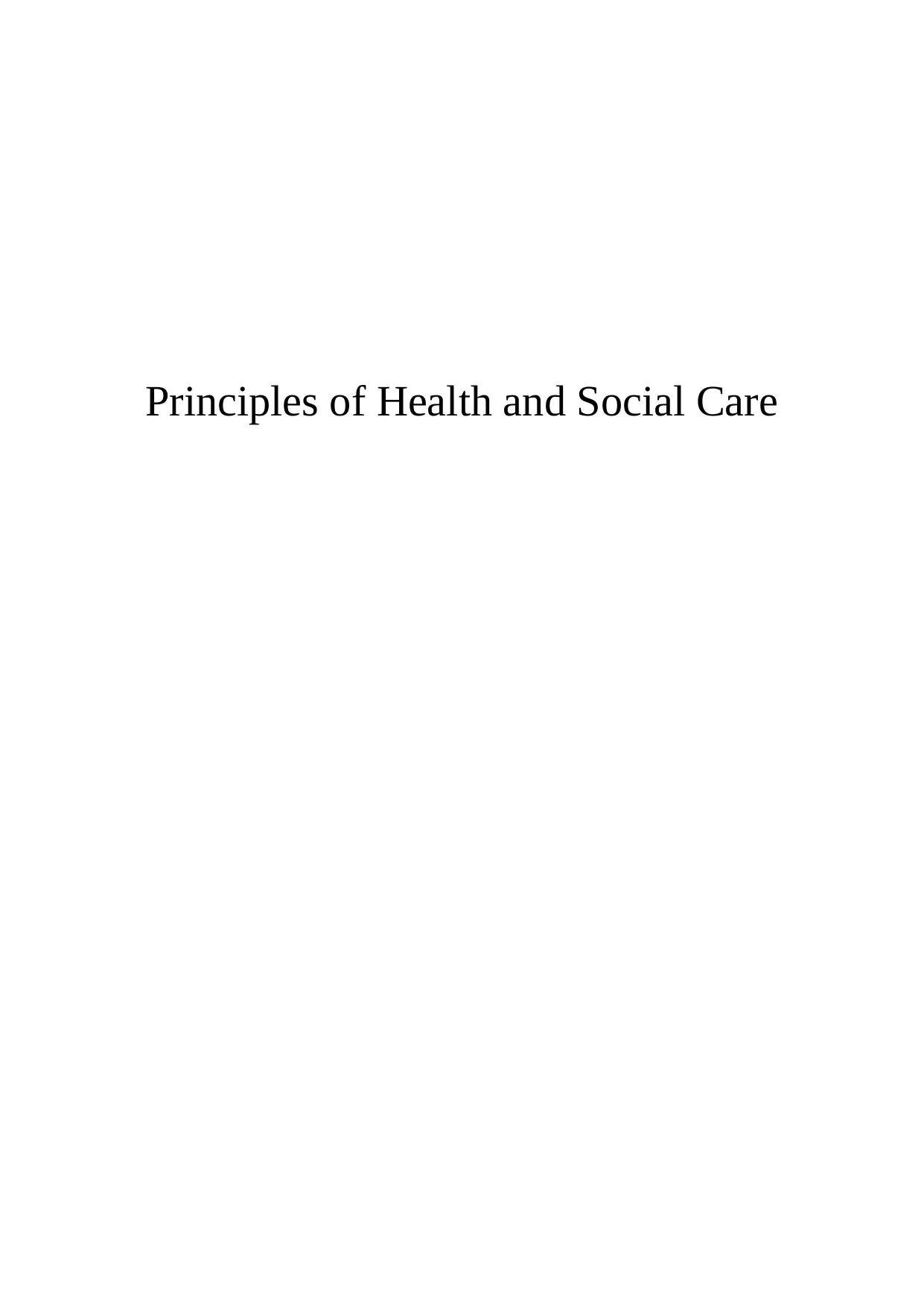
Principles of Health and Social Care
Paraphrase This Document
Need a fresh take? Get an instant paraphrase of this document with our AI Paraphraser
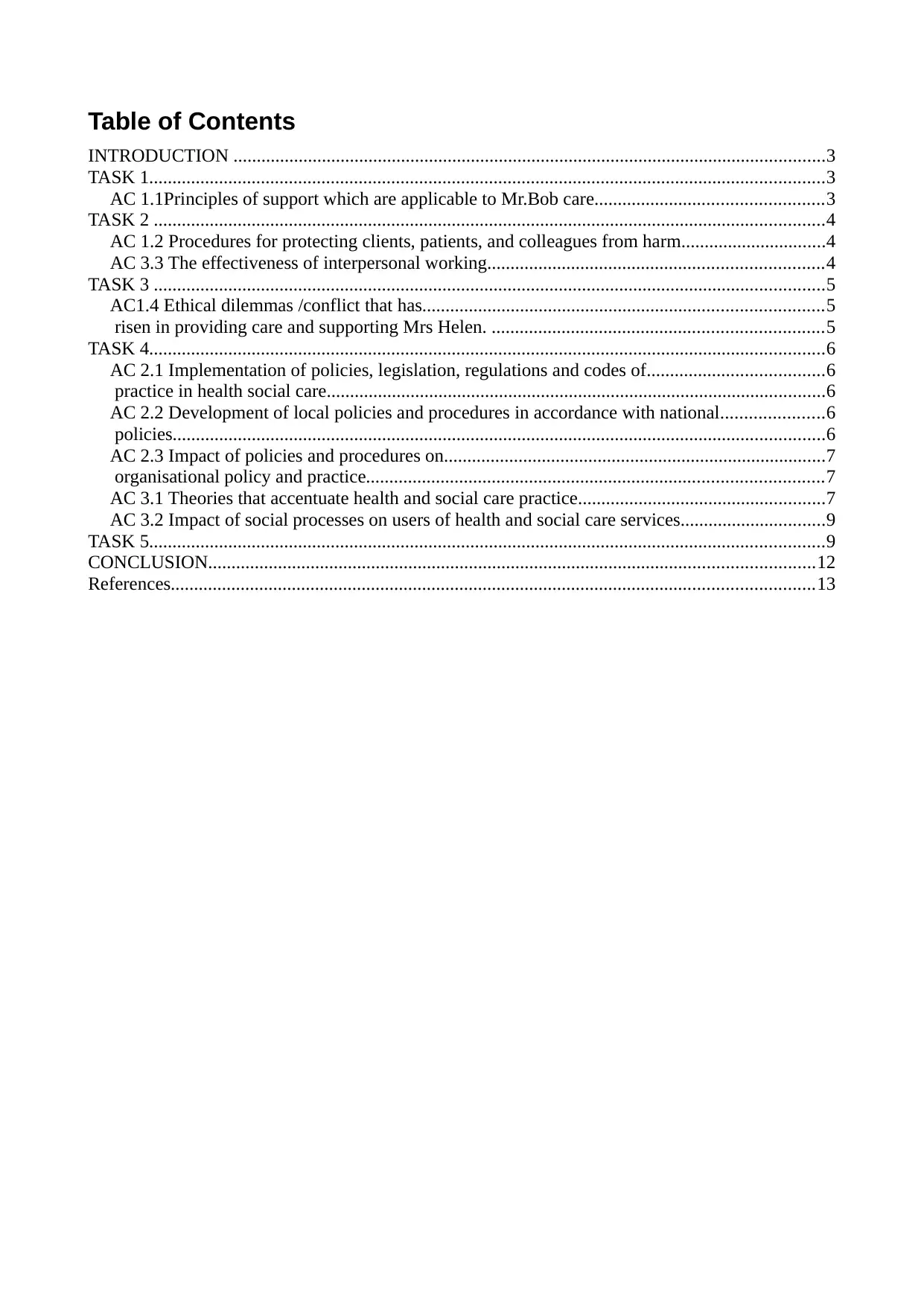
Table of Contents
INTRODUCTION ...............................................................................................................................3
TASK 1.................................................................................................................................................3
AC 1.1Principles of support which are applicable to Mr.Bob care.................................................3
TASK 2 ................................................................................................................................................4
AC 1.2 Procedures for protecting clients, patients, and colleagues from harm...............................4
AC 3.3 The effectiveness of interpersonal working........................................................................4
TASK 3 ................................................................................................................................................5
AC1.4 Ethical dilemmas /conflict that has......................................................................................5
risen in providing care and supporting Mrs Helen. .......................................................................5
TASK 4.................................................................................................................................................6
AC 2.1 Implementation of policies, legislation, regulations and codes of......................................6
practice in health social care...........................................................................................................6
AC 2.2 Development of local policies and procedures in accordance with national......................6
policies............................................................................................................................................6
AC 2.3 Impact of policies and procedures on..................................................................................7
organisational policy and practice..................................................................................................7
AC 3.1 Theories that accentuate health and social care practice.....................................................7
AC 3.2 Impact of social processes on users of health and social care services...............................9
TASK 5.................................................................................................................................................9
CONCLUSION..................................................................................................................................12
References..........................................................................................................................................13
INTRODUCTION ...............................................................................................................................3
TASK 1.................................................................................................................................................3
AC 1.1Principles of support which are applicable to Mr.Bob care.................................................3
TASK 2 ................................................................................................................................................4
AC 1.2 Procedures for protecting clients, patients, and colleagues from harm...............................4
AC 3.3 The effectiveness of interpersonal working........................................................................4
TASK 3 ................................................................................................................................................5
AC1.4 Ethical dilemmas /conflict that has......................................................................................5
risen in providing care and supporting Mrs Helen. .......................................................................5
TASK 4.................................................................................................................................................6
AC 2.1 Implementation of policies, legislation, regulations and codes of......................................6
practice in health social care...........................................................................................................6
AC 2.2 Development of local policies and procedures in accordance with national......................6
policies............................................................................................................................................6
AC 2.3 Impact of policies and procedures on..................................................................................7
organisational policy and practice..................................................................................................7
AC 3.1 Theories that accentuate health and social care practice.....................................................7
AC 3.2 Impact of social processes on users of health and social care services...............................9
TASK 5.................................................................................................................................................9
CONCLUSION..................................................................................................................................12
References..........................................................................................................................................13
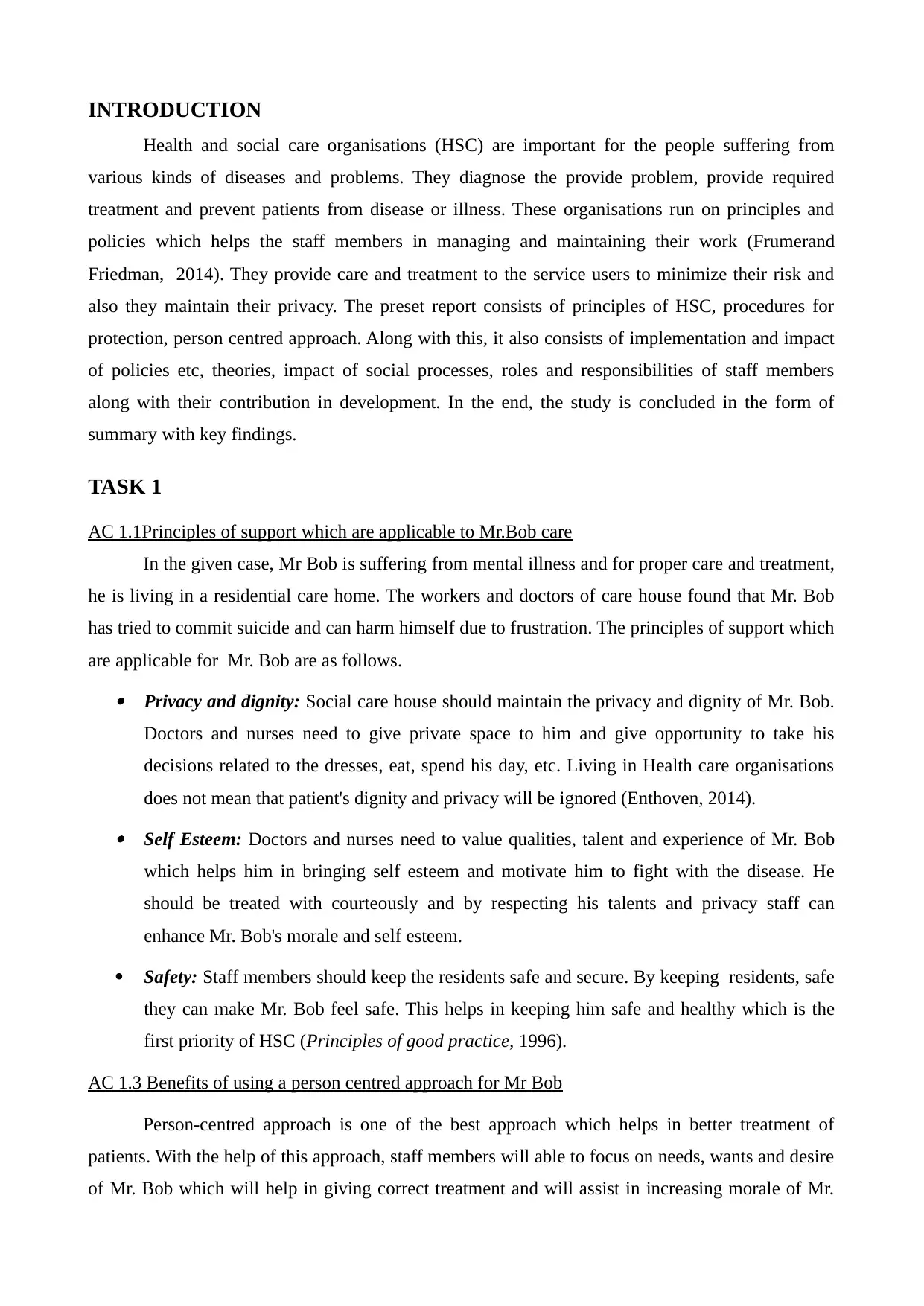
INTRODUCTION
Health and social care organisations (HSC) are important for the people suffering from
various kinds of diseases and problems. They diagnose the provide problem, provide required
treatment and prevent patients from disease or illness. These organisations run on principles and
policies which helps the staff members in managing and maintaining their work (Frumerand
Friedman, 2014). They provide care and treatment to the service users to minimize their risk and
also they maintain their privacy. The preset report consists of principles of HSC, procedures for
protection, person centred approach. Along with this, it also consists of implementation and impact
of policies etc, theories, impact of social processes, roles and responsibilities of staff members
along with their contribution in development. In the end, the study is concluded in the form of
summary with key findings.
TASK 1
AC 1.1Principles of support which are applicable to Mr.Bob care
In the given case, Mr Bob is suffering from mental illness and for proper care and treatment,
he is living in a residential care home. The workers and doctors of care house found that Mr. Bob
has tried to commit suicide and can harm himself due to frustration. The principles of support which
are applicable for Mr. Bob are as follows.
Privacy and dignity: Social care house should maintain the privacy and dignity of Mr. Bob.
Doctors and nurses need to give private space to him and give opportunity to take his
decisions related to the dresses, eat, spend his day, etc. Living in Health care organisations
does not mean that patient's dignity and privacy will be ignored (Enthoven, 2014).
Self Esteem: Doctors and nurses need to value qualities, talent and experience of Mr. Bob
which helps him in bringing self esteem and motivate him to fight with the disease. He
should be treated with courteously and by respecting his talents and privacy staff can
enhance Mr. Bob's morale and self esteem.
Safety: Staff members should keep the residents safe and secure. By keeping residents, safe
they can make Mr. Bob feel safe. This helps in keeping him safe and healthy which is the
first priority of HSC (Principles of good practice, 1996).
AC 1.3 Benefits of using a person centred approach for Mr Bob
Person-centred approach is one of the best approach which helps in better treatment of
patients. With the help of this approach, staff members will able to focus on needs, wants and desire
of Mr. Bob which will help in giving correct treatment and will assist in increasing morale of Mr.
Health and social care organisations (HSC) are important for the people suffering from
various kinds of diseases and problems. They diagnose the provide problem, provide required
treatment and prevent patients from disease or illness. These organisations run on principles and
policies which helps the staff members in managing and maintaining their work (Frumerand
Friedman, 2014). They provide care and treatment to the service users to minimize their risk and
also they maintain their privacy. The preset report consists of principles of HSC, procedures for
protection, person centred approach. Along with this, it also consists of implementation and impact
of policies etc, theories, impact of social processes, roles and responsibilities of staff members
along with their contribution in development. In the end, the study is concluded in the form of
summary with key findings.
TASK 1
AC 1.1Principles of support which are applicable to Mr.Bob care
In the given case, Mr Bob is suffering from mental illness and for proper care and treatment,
he is living in a residential care home. The workers and doctors of care house found that Mr. Bob
has tried to commit suicide and can harm himself due to frustration. The principles of support which
are applicable for Mr. Bob are as follows.
Privacy and dignity: Social care house should maintain the privacy and dignity of Mr. Bob.
Doctors and nurses need to give private space to him and give opportunity to take his
decisions related to the dresses, eat, spend his day, etc. Living in Health care organisations
does not mean that patient's dignity and privacy will be ignored (Enthoven, 2014).
Self Esteem: Doctors and nurses need to value qualities, talent and experience of Mr. Bob
which helps him in bringing self esteem and motivate him to fight with the disease. He
should be treated with courteously and by respecting his talents and privacy staff can
enhance Mr. Bob's morale and self esteem.
Safety: Staff members should keep the residents safe and secure. By keeping residents, safe
they can make Mr. Bob feel safe. This helps in keeping him safe and healthy which is the
first priority of HSC (Principles of good practice, 1996).
AC 1.3 Benefits of using a person centred approach for Mr Bob
Person-centred approach is one of the best approach which helps in better treatment of
patients. With the help of this approach, staff members will able to focus on needs, wants and desire
of Mr. Bob which will help in giving correct treatment and will assist in increasing morale of Mr.
⊘ This is a preview!⊘
Do you want full access?
Subscribe today to unlock all pages.

Trusted by 1+ million students worldwide
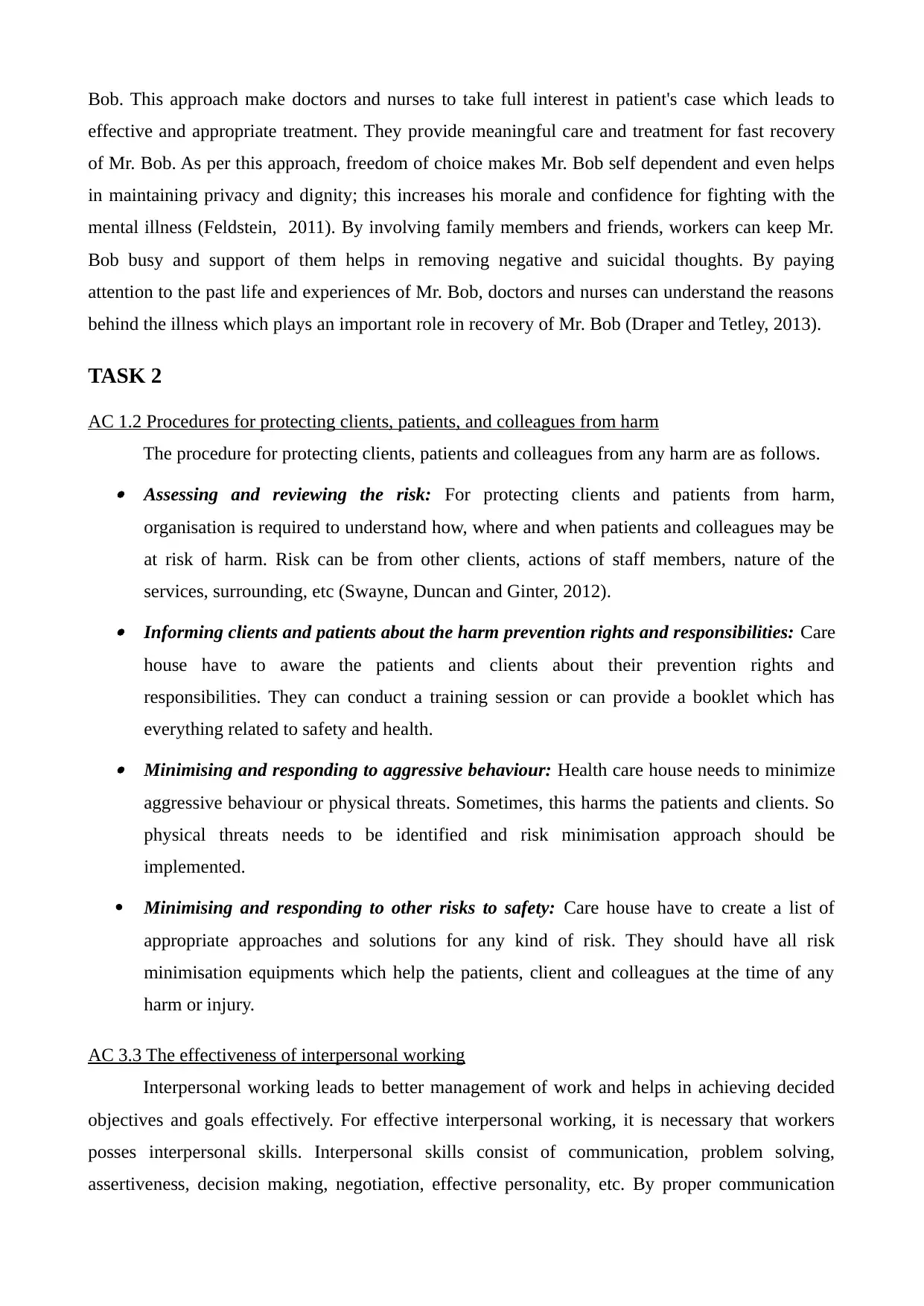
Bob. This approach make doctors and nurses to take full interest in patient's case which leads to
effective and appropriate treatment. They provide meaningful care and treatment for fast recovery
of Mr. Bob. As per this approach, freedom of choice makes Mr. Bob self dependent and even helps
in maintaining privacy and dignity; this increases his morale and confidence for fighting with the
mental illness (Feldstein, 2011). By involving family members and friends, workers can keep Mr.
Bob busy and support of them helps in removing negative and suicidal thoughts. By paying
attention to the past life and experiences of Mr. Bob, doctors and nurses can understand the reasons
behind the illness which plays an important role in recovery of Mr. Bob (Draper and Tetley, 2013).
TASK 2
AC 1.2 Procedures for protecting clients, patients, and colleagues from harm
The procedure for protecting clients, patients and colleagues from any harm are as follows.
Assessing and reviewing the risk: For protecting clients and patients from harm,
organisation is required to understand how, where and when patients and colleagues may be
at risk of harm. Risk can be from other clients, actions of staff members, nature of the
services, surrounding, etc (Swayne, Duncan and Ginter, 2012).
Informing clients and patients about the harm prevention rights and responsibilities: Care
house have to aware the patients and clients about their prevention rights and
responsibilities. They can conduct a training session or can provide a booklet which has
everything related to safety and health.
Minimising and responding to aggressive behaviour: Health care house needs to minimize
aggressive behaviour or physical threats. Sometimes, this harms the patients and clients. So
physical threats needs to be identified and risk minimisation approach should be
implemented.
Minimising and responding to other risks to safety: Care house have to create a list of
appropriate approaches and solutions for any kind of risk. They should have all risk
minimisation equipments which help the patients, client and colleagues at the time of any
harm or injury.
AC 3.3 The effectiveness of interpersonal working
Interpersonal working leads to better management of work and helps in achieving decided
objectives and goals effectively. For effective interpersonal working, it is necessary that workers
posses interpersonal skills. Interpersonal skills consist of communication, problem solving,
assertiveness, decision making, negotiation, effective personality, etc. By proper communication
effective and appropriate treatment. They provide meaningful care and treatment for fast recovery
of Mr. Bob. As per this approach, freedom of choice makes Mr. Bob self dependent and even helps
in maintaining privacy and dignity; this increases his morale and confidence for fighting with the
mental illness (Feldstein, 2011). By involving family members and friends, workers can keep Mr.
Bob busy and support of them helps in removing negative and suicidal thoughts. By paying
attention to the past life and experiences of Mr. Bob, doctors and nurses can understand the reasons
behind the illness which plays an important role in recovery of Mr. Bob (Draper and Tetley, 2013).
TASK 2
AC 1.2 Procedures for protecting clients, patients, and colleagues from harm
The procedure for protecting clients, patients and colleagues from any harm are as follows.
Assessing and reviewing the risk: For protecting clients and patients from harm,
organisation is required to understand how, where and when patients and colleagues may be
at risk of harm. Risk can be from other clients, actions of staff members, nature of the
services, surrounding, etc (Swayne, Duncan and Ginter, 2012).
Informing clients and patients about the harm prevention rights and responsibilities: Care
house have to aware the patients and clients about their prevention rights and
responsibilities. They can conduct a training session or can provide a booklet which has
everything related to safety and health.
Minimising and responding to aggressive behaviour: Health care house needs to minimize
aggressive behaviour or physical threats. Sometimes, this harms the patients and clients. So
physical threats needs to be identified and risk minimisation approach should be
implemented.
Minimising and responding to other risks to safety: Care house have to create a list of
appropriate approaches and solutions for any kind of risk. They should have all risk
minimisation equipments which help the patients, client and colleagues at the time of any
harm or injury.
AC 3.3 The effectiveness of interpersonal working
Interpersonal working leads to better management of work and helps in achieving decided
objectives and goals effectively. For effective interpersonal working, it is necessary that workers
posses interpersonal skills. Interpersonal skills consist of communication, problem solving,
assertiveness, decision making, negotiation, effective personality, etc. By proper communication
Paraphrase This Document
Need a fresh take? Get an instant paraphrase of this document with our AI Paraphraser
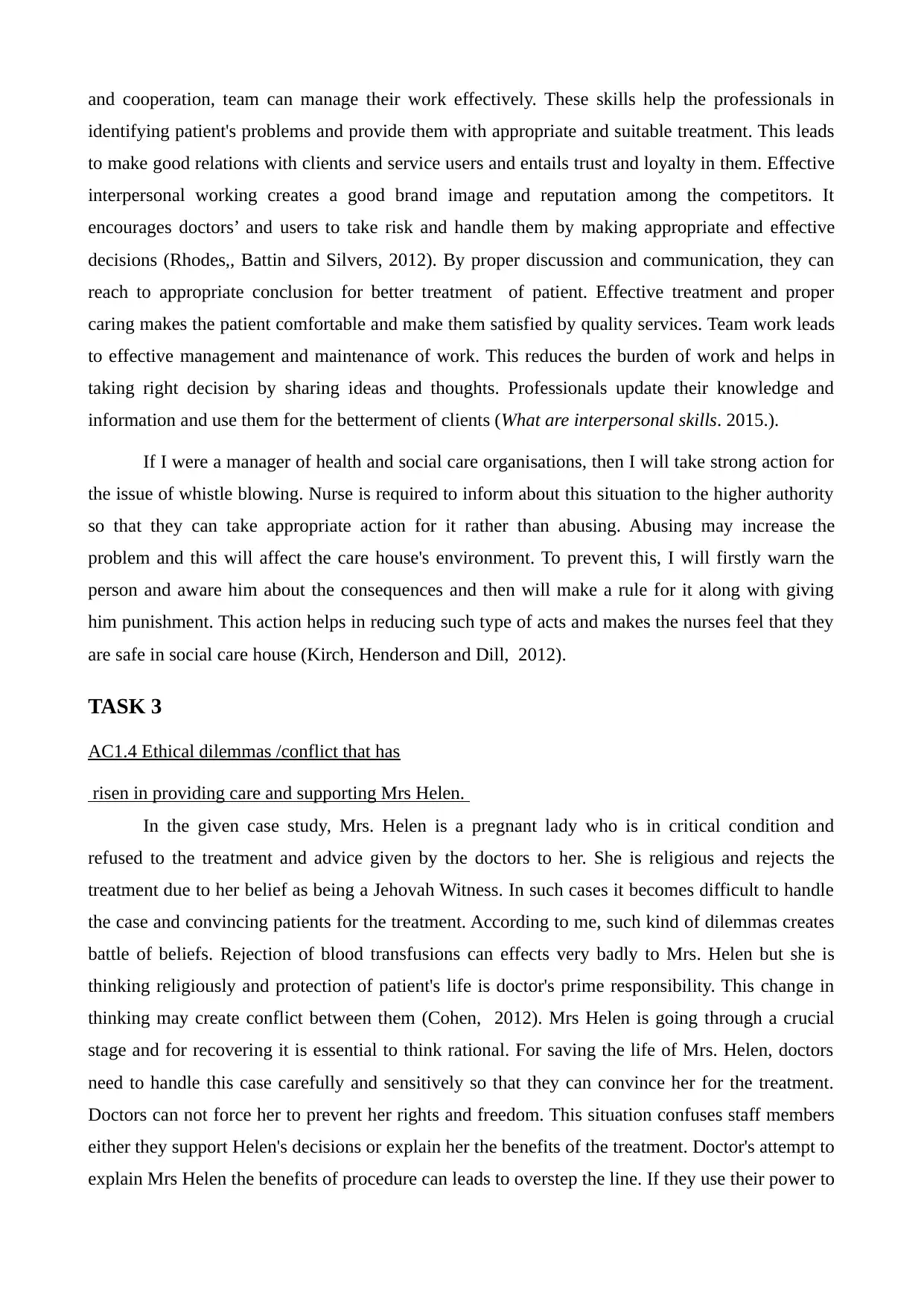
and cooperation, team can manage their work effectively. These skills help the professionals in
identifying patient's problems and provide them with appropriate and suitable treatment. This leads
to make good relations with clients and service users and entails trust and loyalty in them. Effective
interpersonal working creates a good brand image and reputation among the competitors. It
encourages doctors’ and users to take risk and handle them by making appropriate and effective
decisions (Rhodes,, Battin and Silvers, 2012). By proper discussion and communication, they can
reach to appropriate conclusion for better treatment of patient. Effective treatment and proper
caring makes the patient comfortable and make them satisfied by quality services. Team work leads
to effective management and maintenance of work. This reduces the burden of work and helps in
taking right decision by sharing ideas and thoughts. Professionals update their knowledge and
information and use them for the betterment of clients (What are interpersonal skills. 2015.).
If I were a manager of health and social care organisations, then I will take strong action for
the issue of whistle blowing. Nurse is required to inform about this situation to the higher authority
so that they can take appropriate action for it rather than abusing. Abusing may increase the
problem and this will affect the care house's environment. To prevent this, I will firstly warn the
person and aware him about the consequences and then will make a rule for it along with giving
him punishment. This action helps in reducing such type of acts and makes the nurses feel that they
are safe in social care house (Kirch, Henderson and Dill, 2012).
TASK 3
AC1.4 Ethical dilemmas /conflict that has
risen in providing care and supporting Mrs Helen.
In the given case study, Mrs. Helen is a pregnant lady who is in critical condition and
refused to the treatment and advice given by the doctors to her. She is religious and rejects the
treatment due to her belief as being a Jehovah Witness. In such cases it becomes difficult to handle
the case and convincing patients for the treatment. According to me, such kind of dilemmas creates
battle of beliefs. Rejection of blood transfusions can effects very badly to Mrs. Helen but she is
thinking religiously and protection of patient's life is doctor's prime responsibility. This change in
thinking may create conflict between them (Cohen, 2012). Mrs Helen is going through a crucial
stage and for recovering it is essential to think rational. For saving the life of Mrs. Helen, doctors
need to handle this case carefully and sensitively so that they can convince her for the treatment.
Doctors can not force her to prevent her rights and freedom. This situation confuses staff members
either they support Helen's decisions or explain her the benefits of the treatment. Doctor's attempt to
explain Mrs Helen the benefits of procedure can leads to overstep the line. If they use their power to
identifying patient's problems and provide them with appropriate and suitable treatment. This leads
to make good relations with clients and service users and entails trust and loyalty in them. Effective
interpersonal working creates a good brand image and reputation among the competitors. It
encourages doctors’ and users to take risk and handle them by making appropriate and effective
decisions (Rhodes,, Battin and Silvers, 2012). By proper discussion and communication, they can
reach to appropriate conclusion for better treatment of patient. Effective treatment and proper
caring makes the patient comfortable and make them satisfied by quality services. Team work leads
to effective management and maintenance of work. This reduces the burden of work and helps in
taking right decision by sharing ideas and thoughts. Professionals update their knowledge and
information and use them for the betterment of clients (What are interpersonal skills. 2015.).
If I were a manager of health and social care organisations, then I will take strong action for
the issue of whistle blowing. Nurse is required to inform about this situation to the higher authority
so that they can take appropriate action for it rather than abusing. Abusing may increase the
problem and this will affect the care house's environment. To prevent this, I will firstly warn the
person and aware him about the consequences and then will make a rule for it along with giving
him punishment. This action helps in reducing such type of acts and makes the nurses feel that they
are safe in social care house (Kirch, Henderson and Dill, 2012).
TASK 3
AC1.4 Ethical dilemmas /conflict that has
risen in providing care and supporting Mrs Helen.
In the given case study, Mrs. Helen is a pregnant lady who is in critical condition and
refused to the treatment and advice given by the doctors to her. She is religious and rejects the
treatment due to her belief as being a Jehovah Witness. In such cases it becomes difficult to handle
the case and convincing patients for the treatment. According to me, such kind of dilemmas creates
battle of beliefs. Rejection of blood transfusions can effects very badly to Mrs. Helen but she is
thinking religiously and protection of patient's life is doctor's prime responsibility. This change in
thinking may create conflict between them (Cohen, 2012). Mrs Helen is going through a crucial
stage and for recovering it is essential to think rational. For saving the life of Mrs. Helen, doctors
need to handle this case carefully and sensitively so that they can convince her for the treatment.
Doctors can not force her to prevent her rights and freedom. This situation confuses staff members
either they support Helen's decisions or explain her the benefits of the treatment. Doctor's attempt to
explain Mrs Helen the benefits of procedure can leads to overstep the line. If they use their power to
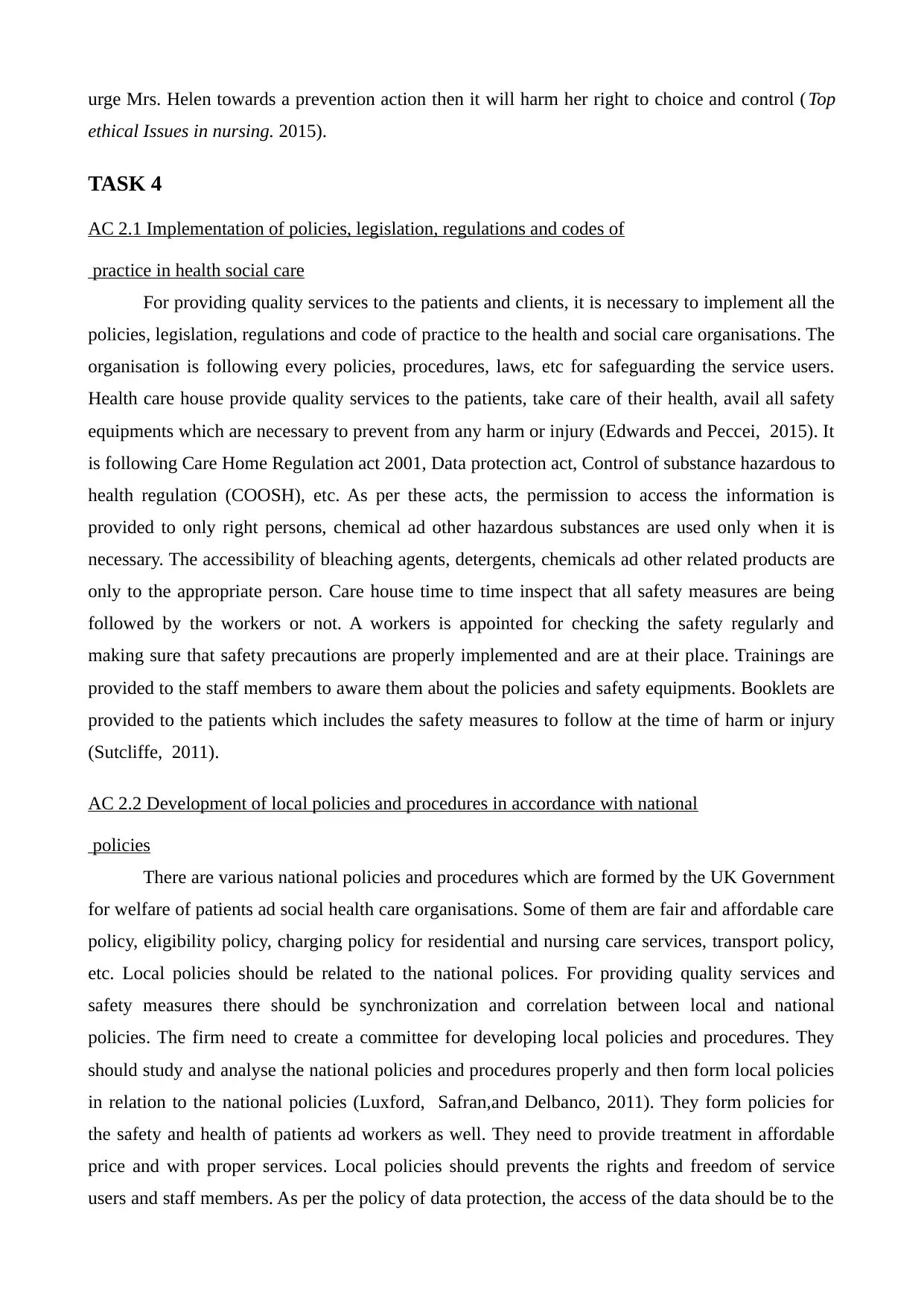
urge Mrs. Helen towards a prevention action then it will harm her right to choice and control ( Top
ethical Issues in nursing. 2015).
TASK 4
AC 2.1 Implementation of policies, legislation, regulations and codes of
practice in health social care
For providing quality services to the patients and clients, it is necessary to implement all the
policies, legislation, regulations and code of practice to the health and social care organisations. The
organisation is following every policies, procedures, laws, etc for safeguarding the service users.
Health care house provide quality services to the patients, take care of their health, avail all safety
equipments which are necessary to prevent from any harm or injury (Edwards and Peccei, 2015). It
is following Care Home Regulation act 2001, Data protection act, Control of substance hazardous to
health regulation (COOSH), etc. As per these acts, the permission to access the information is
provided to only right persons, chemical ad other hazardous substances are used only when it is
necessary. The accessibility of bleaching agents, detergents, chemicals ad other related products are
only to the appropriate person. Care house time to time inspect that all safety measures are being
followed by the workers or not. A workers is appointed for checking the safety regularly and
making sure that safety precautions are properly implemented and are at their place. Trainings are
provided to the staff members to aware them about the policies and safety equipments. Booklets are
provided to the patients which includes the safety measures to follow at the time of harm or injury
(Sutcliffe, 2011).
AC 2.2 Development of local policies and procedures in accordance with national
policies
There are various national policies and procedures which are formed by the UK Government
for welfare of patients ad social health care organisations. Some of them are fair and affordable care
policy, eligibility policy, charging policy for residential and nursing care services, transport policy,
etc. Local policies should be related to the national polices. For providing quality services and
safety measures there should be synchronization and correlation between local and national
policies. The firm need to create a committee for developing local policies and procedures. They
should study and analyse the national policies and procedures properly and then form local policies
in relation to the national policies (Luxford, Safran,and Delbanco, 2011). They form policies for
the safety and health of patients ad workers as well. They need to provide treatment in affordable
price and with proper services. Local policies should prevents the rights and freedom of service
users and staff members. As per the policy of data protection, the access of the data should be to the
ethical Issues in nursing. 2015).
TASK 4
AC 2.1 Implementation of policies, legislation, regulations and codes of
practice in health social care
For providing quality services to the patients and clients, it is necessary to implement all the
policies, legislation, regulations and code of practice to the health and social care organisations. The
organisation is following every policies, procedures, laws, etc for safeguarding the service users.
Health care house provide quality services to the patients, take care of their health, avail all safety
equipments which are necessary to prevent from any harm or injury (Edwards and Peccei, 2015). It
is following Care Home Regulation act 2001, Data protection act, Control of substance hazardous to
health regulation (COOSH), etc. As per these acts, the permission to access the information is
provided to only right persons, chemical ad other hazardous substances are used only when it is
necessary. The accessibility of bleaching agents, detergents, chemicals ad other related products are
only to the appropriate person. Care house time to time inspect that all safety measures are being
followed by the workers or not. A workers is appointed for checking the safety regularly and
making sure that safety precautions are properly implemented and are at their place. Trainings are
provided to the staff members to aware them about the policies and safety equipments. Booklets are
provided to the patients which includes the safety measures to follow at the time of harm or injury
(Sutcliffe, 2011).
AC 2.2 Development of local policies and procedures in accordance with national
policies
There are various national policies and procedures which are formed by the UK Government
for welfare of patients ad social health care organisations. Some of them are fair and affordable care
policy, eligibility policy, charging policy for residential and nursing care services, transport policy,
etc. Local policies should be related to the national polices. For providing quality services and
safety measures there should be synchronization and correlation between local and national
policies. The firm need to create a committee for developing local policies and procedures. They
should study and analyse the national policies and procedures properly and then form local policies
in relation to the national policies (Luxford, Safran,and Delbanco, 2011). They form policies for
the safety and health of patients ad workers as well. They need to provide treatment in affordable
price and with proper services. Local policies should prevents the rights and freedom of service
users and staff members. As per the policy of data protection, the access of the data should be to the
⊘ This is a preview!⊘
Do you want full access?
Subscribe today to unlock all pages.

Trusted by 1+ million students worldwide
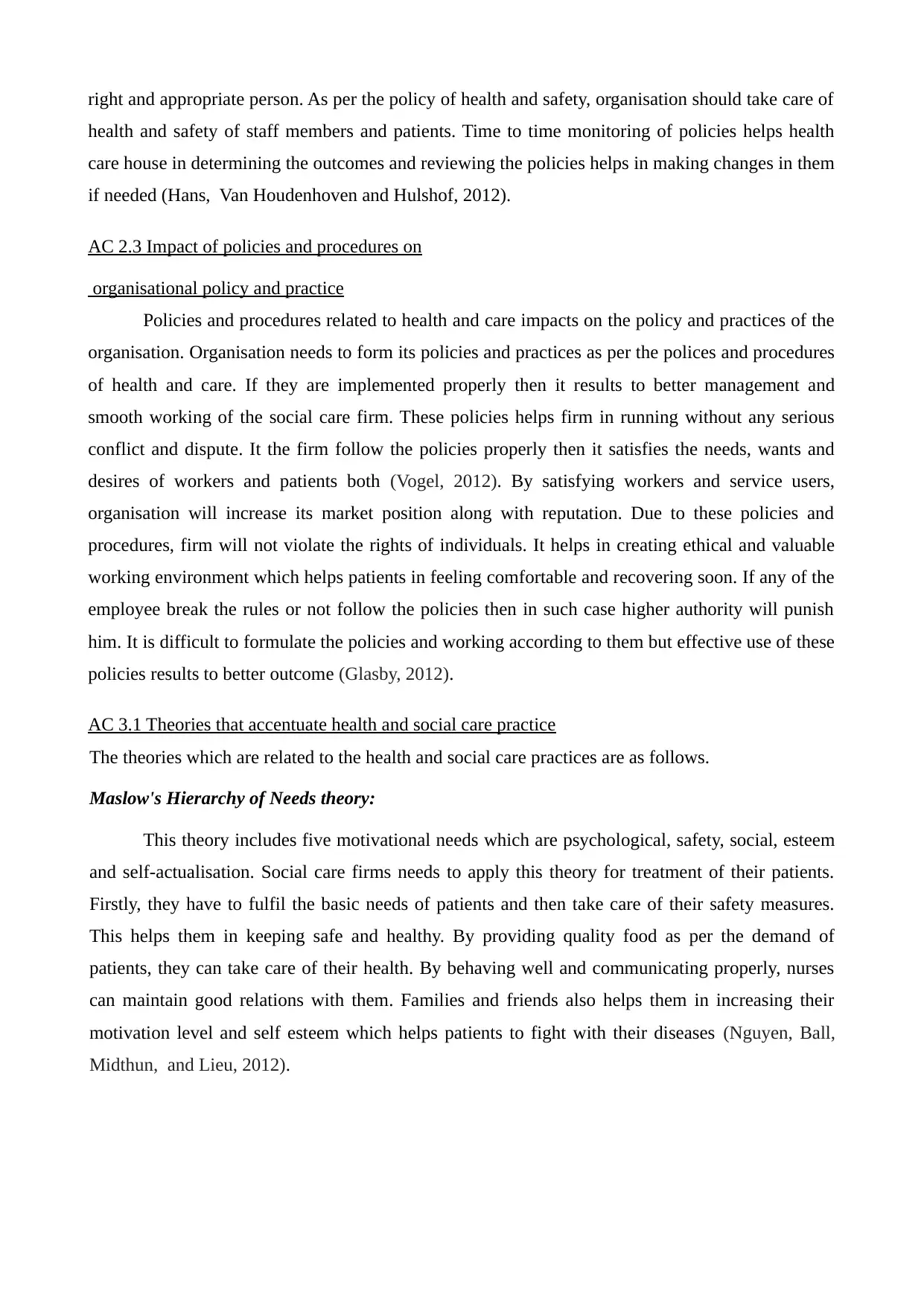
right and appropriate person. As per the policy of health and safety, organisation should take care of
health and safety of staff members and patients. Time to time monitoring of policies helps health
care house in determining the outcomes and reviewing the policies helps in making changes in them
if needed (Hans, Van Houdenhoven and Hulshof, 2012).
AC 2.3 Impact of policies and procedures on
organisational policy and practice
Policies and procedures related to health and care impacts on the policy and practices of the
organisation. Organisation needs to form its policies and practices as per the polices and procedures
of health and care. If they are implemented properly then it results to better management and
smooth working of the social care firm. These policies helps firm in running without any serious
conflict and dispute. It the firm follow the policies properly then it satisfies the needs, wants and
desires of workers and patients both (Vogel, 2012). By satisfying workers and service users,
organisation will increase its market position along with reputation. Due to these policies and
procedures, firm will not violate the rights of individuals. It helps in creating ethical and valuable
working environment which helps patients in feeling comfortable and recovering soon. If any of the
employee break the rules or not follow the policies then in such case higher authority will punish
him. It is difficult to formulate the policies and working according to them but effective use of these
policies results to better outcome (Glasby, 2012).
AC 3.1 Theories that accentuate health and social care practice
The theories which are related to the health and social care practices are as follows.
Maslow's Hierarchy of Needs theory:
This theory includes five motivational needs which are psychological, safety, social, esteem
and self-actualisation. Social care firms needs to apply this theory for treatment of their patients.
Firstly, they have to fulfil the basic needs of patients and then take care of their safety measures.
This helps them in keeping safe and healthy. By providing quality food as per the demand of
patients, they can take care of their health. By behaving well and communicating properly, nurses
can maintain good relations with them. Families and friends also helps them in increasing their
motivation level and self esteem which helps patients to fight with their diseases (Nguyen, Ball,
Midthun, and Lieu, 2012).
health and safety of staff members and patients. Time to time monitoring of policies helps health
care house in determining the outcomes and reviewing the policies helps in making changes in them
if needed (Hans, Van Houdenhoven and Hulshof, 2012).
AC 2.3 Impact of policies and procedures on
organisational policy and practice
Policies and procedures related to health and care impacts on the policy and practices of the
organisation. Organisation needs to form its policies and practices as per the polices and procedures
of health and care. If they are implemented properly then it results to better management and
smooth working of the social care firm. These policies helps firm in running without any serious
conflict and dispute. It the firm follow the policies properly then it satisfies the needs, wants and
desires of workers and patients both (Vogel, 2012). By satisfying workers and service users,
organisation will increase its market position along with reputation. Due to these policies and
procedures, firm will not violate the rights of individuals. It helps in creating ethical and valuable
working environment which helps patients in feeling comfortable and recovering soon. If any of the
employee break the rules or not follow the policies then in such case higher authority will punish
him. It is difficult to formulate the policies and working according to them but effective use of these
policies results to better outcome (Glasby, 2012).
AC 3.1 Theories that accentuate health and social care practice
The theories which are related to the health and social care practices are as follows.
Maslow's Hierarchy of Needs theory:
This theory includes five motivational needs which are psychological, safety, social, esteem
and self-actualisation. Social care firms needs to apply this theory for treatment of their patients.
Firstly, they have to fulfil the basic needs of patients and then take care of their safety measures.
This helps them in keeping safe and healthy. By providing quality food as per the demand of
patients, they can take care of their health. By behaving well and communicating properly, nurses
can maintain good relations with them. Families and friends also helps them in increasing their
motivation level and self esteem which helps patients to fight with their diseases (Nguyen, Ball,
Midthun, and Lieu, 2012).
Paraphrase This Document
Need a fresh take? Get an instant paraphrase of this document with our AI Paraphraser
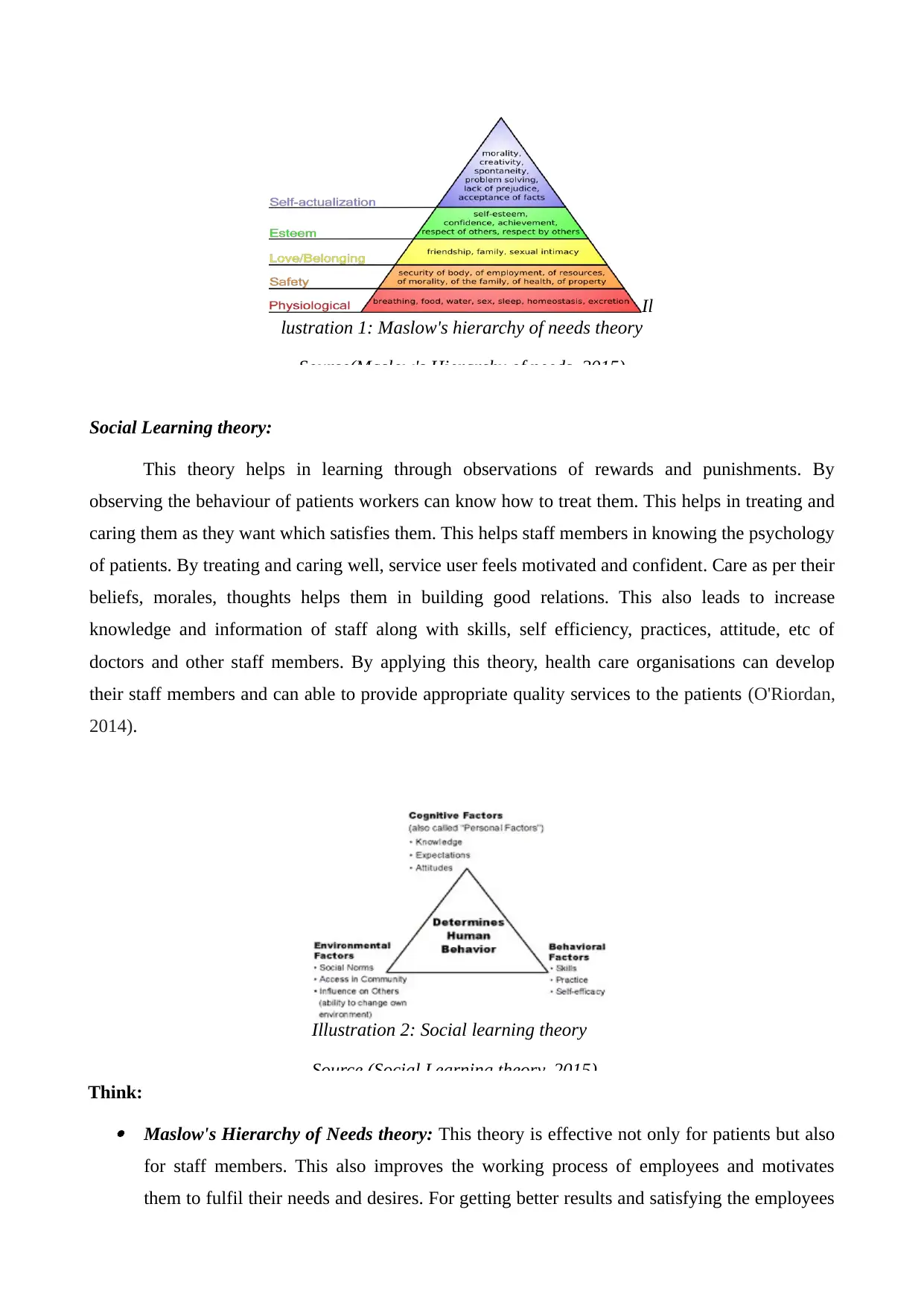
Social Learning theory:
This theory helps in learning through observations of rewards and punishments. By
observing the behaviour of patients workers can know how to treat them. This helps in treating and
caring them as they want which satisfies them. This helps staff members in knowing the psychology
of patients. By treating and caring well, service user feels motivated and confident. Care as per their
beliefs, morales, thoughts helps them in building good relations. This also leads to increase
knowledge and information of staff along with skills, self efficiency, practices, attitude, etc of
doctors and other staff members. By applying this theory, health care organisations can develop
their staff members and can able to provide appropriate quality services to the patients (O'Riordan,
2014).
Think:
Maslow's Hierarchy of Needs theory: This theory is effective not only for patients but also
for staff members. This also improves the working process of employees and motivates
them to fulfil their needs and desires. For getting better results and satisfying the employees
Illustration 2: Social learning theory
Source (Social Learning theory. 2015)
Il
lustration 1: Maslow's hierarchy of needs theory
Source(Maslow's Hierarchy of needs. 2015)
This theory helps in learning through observations of rewards and punishments. By
observing the behaviour of patients workers can know how to treat them. This helps in treating and
caring them as they want which satisfies them. This helps staff members in knowing the psychology
of patients. By treating and caring well, service user feels motivated and confident. Care as per their
beliefs, morales, thoughts helps them in building good relations. This also leads to increase
knowledge and information of staff along with skills, self efficiency, practices, attitude, etc of
doctors and other staff members. By applying this theory, health care organisations can develop
their staff members and can able to provide appropriate quality services to the patients (O'Riordan,
2014).
Think:
Maslow's Hierarchy of Needs theory: This theory is effective not only for patients but also
for staff members. This also improves the working process of employees and motivates
them to fulfil their needs and desires. For getting better results and satisfying the employees
Illustration 2: Social learning theory
Source (Social Learning theory. 2015)
Il
lustration 1: Maslow's hierarchy of needs theory
Source(Maslow's Hierarchy of needs. 2015)
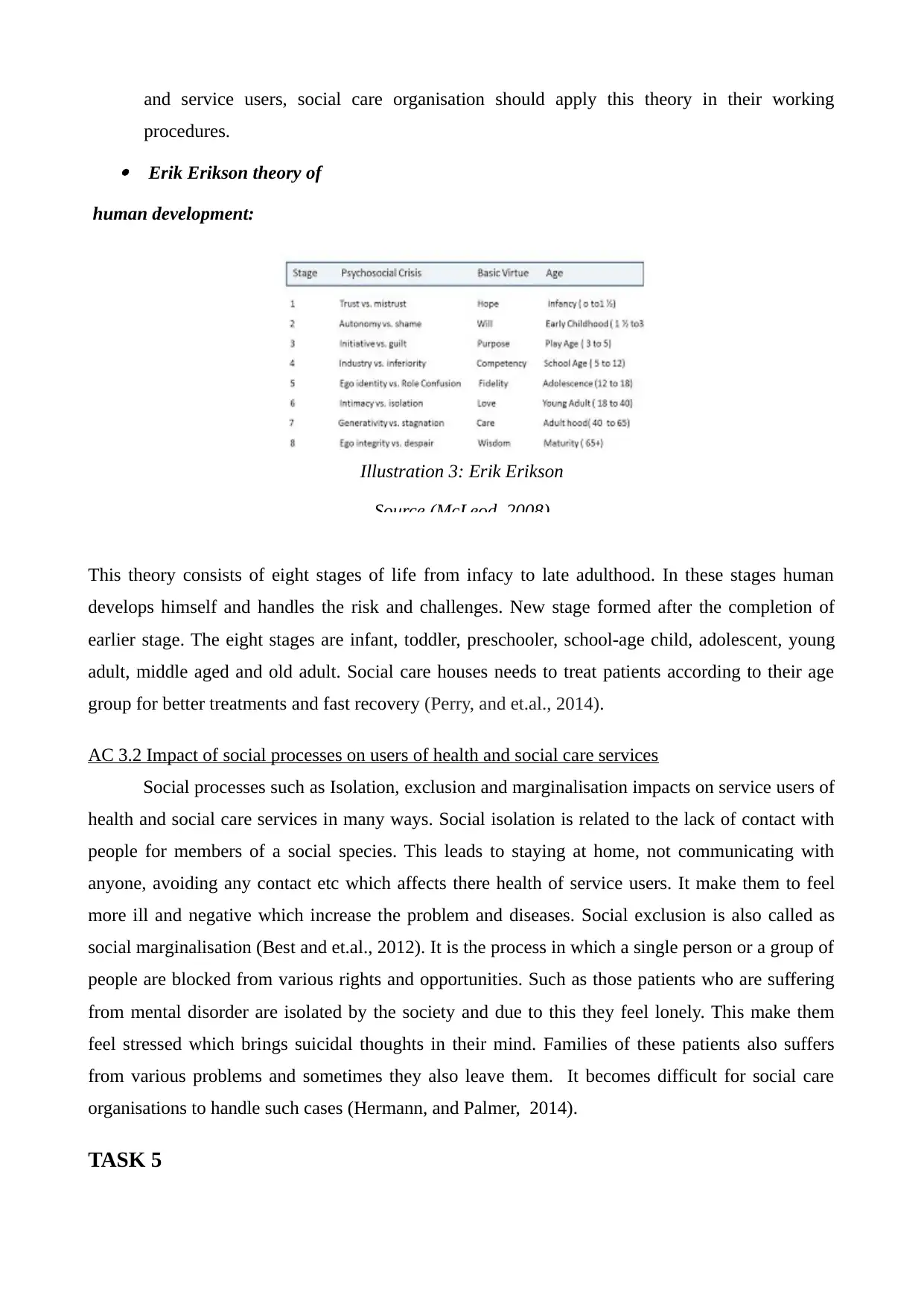
and service users, social care organisation should apply this theory in their working
procedures. Erik Erikson theory of
human development:
This theory consists of eight stages of life from infacy to late adulthood. In these stages human
develops himself and handles the risk and challenges. New stage formed after the completion of
earlier stage. The eight stages are infant, toddler, preschooler, school-age child, adolescent, young
adult, middle aged and old adult. Social care houses needs to treat patients according to their age
group for better treatments and fast recovery (Perry, and et.al., 2014).
AC 3.2 Impact of social processes on users of health and social care services
Social processes such as Isolation, exclusion and marginalisation impacts on service users of
health and social care services in many ways. Social isolation is related to the lack of contact with
people for members of a social species. This leads to staying at home, not communicating with
anyone, avoiding any contact etc which affects there health of service users. It make them to feel
more ill and negative which increase the problem and diseases. Social exclusion is also called as
social marginalisation (Best and et.al., 2012). It is the process in which a single person or a group of
people are blocked from various rights and opportunities. Such as those patients who are suffering
from mental disorder are isolated by the society and due to this they feel lonely. This make them
feel stressed which brings suicidal thoughts in their mind. Families of these patients also suffers
from various problems and sometimes they also leave them. It becomes difficult for social care
organisations to handle such cases (Hermann, and Palmer, 2014).
TASK 5
Illustration 3: Erik Erikson
Source (McLeod, 2008)
procedures. Erik Erikson theory of
human development:
This theory consists of eight stages of life from infacy to late adulthood. In these stages human
develops himself and handles the risk and challenges. New stage formed after the completion of
earlier stage. The eight stages are infant, toddler, preschooler, school-age child, adolescent, young
adult, middle aged and old adult. Social care houses needs to treat patients according to their age
group for better treatments and fast recovery (Perry, and et.al., 2014).
AC 3.2 Impact of social processes on users of health and social care services
Social processes such as Isolation, exclusion and marginalisation impacts on service users of
health and social care services in many ways. Social isolation is related to the lack of contact with
people for members of a social species. This leads to staying at home, not communicating with
anyone, avoiding any contact etc which affects there health of service users. It make them to feel
more ill and negative which increase the problem and diseases. Social exclusion is also called as
social marginalisation (Best and et.al., 2012). It is the process in which a single person or a group of
people are blocked from various rights and opportunities. Such as those patients who are suffering
from mental disorder are isolated by the society and due to this they feel lonely. This make them
feel stressed which brings suicidal thoughts in their mind. Families of these patients also suffers
from various problems and sometimes they also leave them. It becomes difficult for social care
organisations to handle such cases (Hermann, and Palmer, 2014).
TASK 5
Illustration 3: Erik Erikson
Source (McLeod, 2008)
⊘ This is a preview!⊘
Do you want full access?
Subscribe today to unlock all pages.

Trusted by 1+ million students worldwide
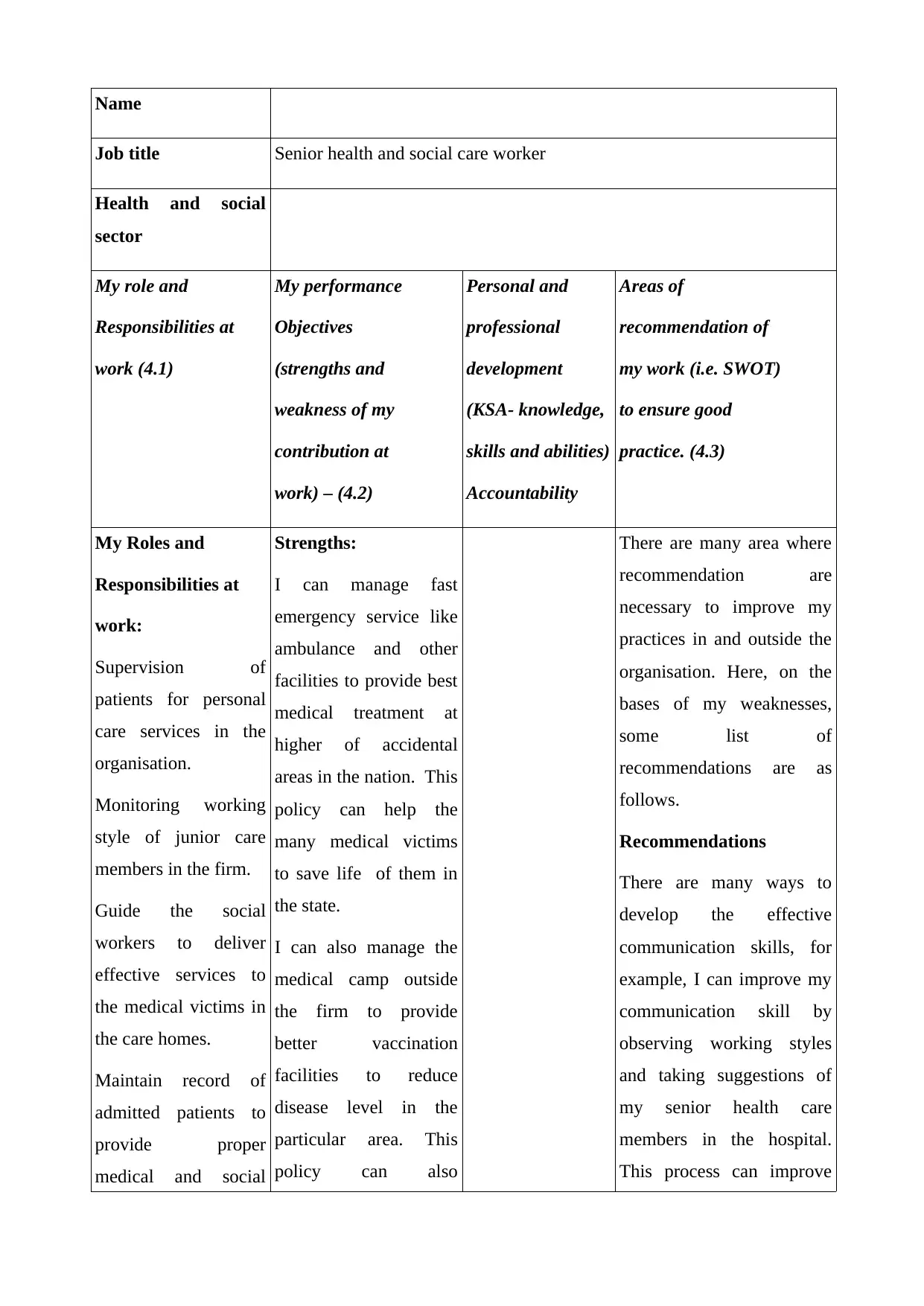
Name
Job title Senior health and social care worker
Health and social
sector
My role and
Responsibilities at
work (4.1)
My performance
Objectives
(strengths and
weakness of my
contribution at
work) – (4.2)
Personal and
professional
development
(KSA- knowledge,
skills and abilities)
Accountability
Areas of
recommendation of
my work (i.e. SWOT)
to ensure good
practice. (4.3)
My Roles and
Responsibilities at
work:
Supervision of
patients for personal
care services in the
organisation.
Monitoring working
style of junior care
members in the firm.
Guide the social
workers to deliver
effective services to
the medical victims in
the care homes.
Maintain record of
admitted patients to
provide proper
medical and social
Strengths:
I can manage fast
emergency service like
ambulance and other
facilities to provide best
medical treatment at
higher of accidental
areas in the nation. This
policy can help the
many medical victims
to save life of them in
the state.
I can also manage the
medical camp outside
the firm to provide
better vaccination
facilities to reduce
disease level in the
particular area. This
policy can also
There are many area where
recommendation are
necessary to improve my
practices in and outside the
organisation. Here, on the
bases of my weaknesses,
some list of
recommendations are as
follows.
Recommendations
There are many ways to
develop the effective
communication skills, for
example, I can improve my
communication skill by
observing working styles
and taking suggestions of
my senior health care
members in the hospital.
This process can improve
Job title Senior health and social care worker
Health and social
sector
My role and
Responsibilities at
work (4.1)
My performance
Objectives
(strengths and
weakness of my
contribution at
work) – (4.2)
Personal and
professional
development
(KSA- knowledge,
skills and abilities)
Accountability
Areas of
recommendation of
my work (i.e. SWOT)
to ensure good
practice. (4.3)
My Roles and
Responsibilities at
work:
Supervision of
patients for personal
care services in the
organisation.
Monitoring working
style of junior care
members in the firm.
Guide the social
workers to deliver
effective services to
the medical victims in
the care homes.
Maintain record of
admitted patients to
provide proper
medical and social
Strengths:
I can manage fast
emergency service like
ambulance and other
facilities to provide best
medical treatment at
higher of accidental
areas in the nation. This
policy can help the
many medical victims
to save life of them in
the state.
I can also manage the
medical camp outside
the firm to provide
better vaccination
facilities to reduce
disease level in the
particular area. This
policy can also
There are many area where
recommendation are
necessary to improve my
practices in and outside the
organisation. Here, on the
bases of my weaknesses,
some list of
recommendations are as
follows.
Recommendations
There are many ways to
develop the effective
communication skills, for
example, I can improve my
communication skill by
observing working styles
and taking suggestions of
my senior health care
members in the hospital.
This process can improve
Paraphrase This Document
Need a fresh take? Get an instant paraphrase of this document with our AI Paraphraser
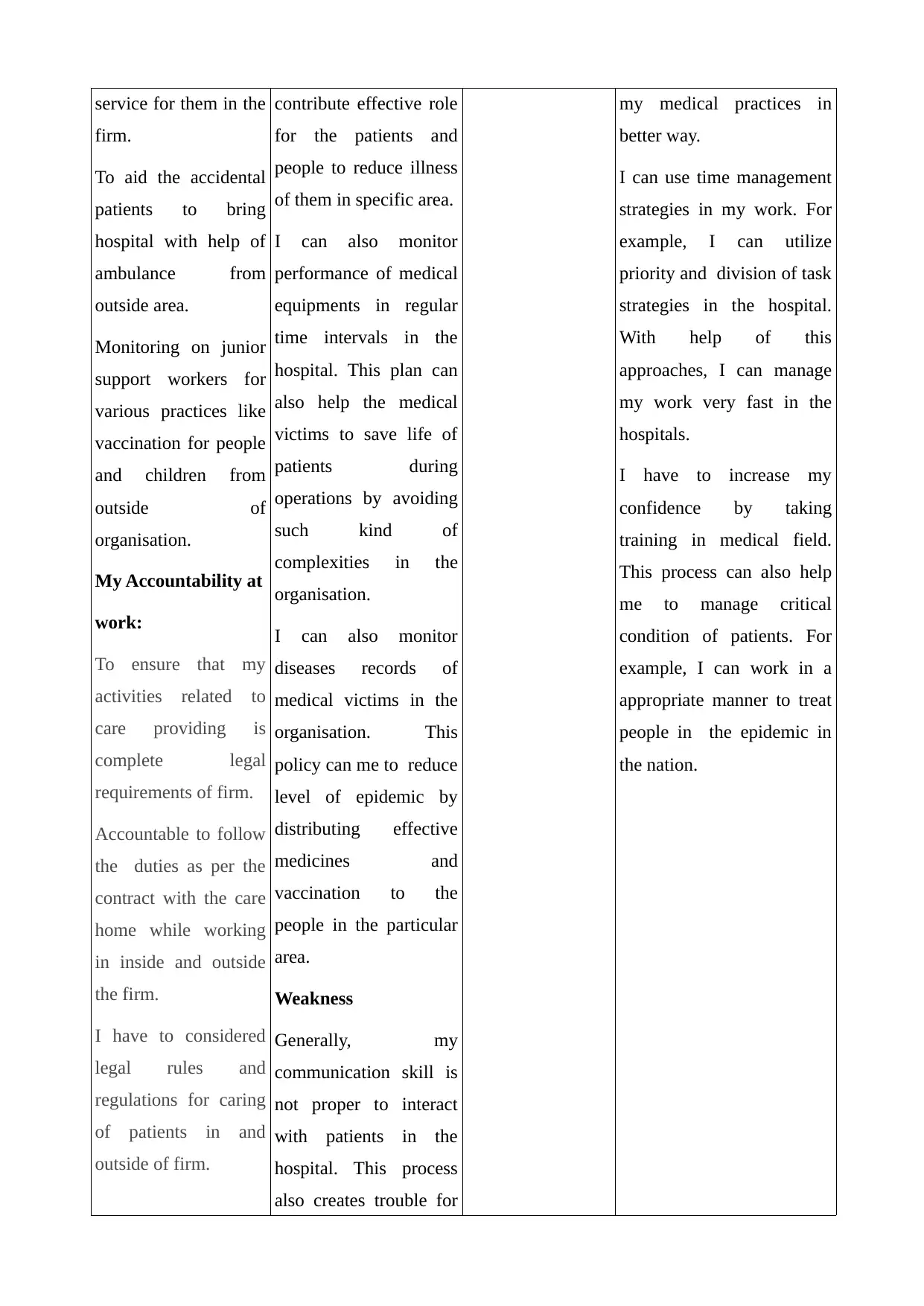
service for them in the
firm.
To aid the accidental
patients to bring
hospital with help of
ambulance from
outside area.
Monitoring on junior
support workers for
various practices like
vaccination for people
and children from
outside of
organisation.
My Accountability at
work:
To ensure that my
activities related to
care providing is
complete legal
requirements of firm.
Accountable to follow
the duties as per the
contract with the care
home while working
in inside and outside
the firm.
I have to considered
legal rules and
regulations for caring
of patients in and
outside of firm.
contribute effective role
for the patients and
people to reduce illness
of them in specific area.
I can also monitor
performance of medical
equipments in regular
time intervals in the
hospital. This plan can
also help the medical
victims to save life of
patients during
operations by avoiding
such kind of
complexities in the
organisation.
I can also monitor
diseases records of
medical victims in the
organisation. This
policy can me to reduce
level of epidemic by
distributing effective
medicines and
vaccination to the
people in the particular
area.
Weakness
Generally, my
communication skill is
not proper to interact
with patients in the
hospital. This process
also creates trouble for
my medical practices in
better way.
I can use time management
strategies in my work. For
example, I can utilize
priority and division of task
strategies in the hospital.
With help of this
approaches, I can manage
my work very fast in the
hospitals.
I have to increase my
confidence by taking
training in medical field.
This process can also help
me to manage critical
condition of patients. For
example, I can work in a
appropriate manner to treat
people in the epidemic in
the nation.
firm.
To aid the accidental
patients to bring
hospital with help of
ambulance from
outside area.
Monitoring on junior
support workers for
various practices like
vaccination for people
and children from
outside of
organisation.
My Accountability at
work:
To ensure that my
activities related to
care providing is
complete legal
requirements of firm.
Accountable to follow
the duties as per the
contract with the care
home while working
in inside and outside
the firm.
I have to considered
legal rules and
regulations for caring
of patients in and
outside of firm.
contribute effective role
for the patients and
people to reduce illness
of them in specific area.
I can also monitor
performance of medical
equipments in regular
time intervals in the
hospital. This plan can
also help the medical
victims to save life of
patients during
operations by avoiding
such kind of
complexities in the
organisation.
I can also monitor
diseases records of
medical victims in the
organisation. This
policy can me to reduce
level of epidemic by
distributing effective
medicines and
vaccination to the
people in the particular
area.
Weakness
Generally, my
communication skill is
not proper to interact
with patients in the
hospital. This process
also creates trouble for
my medical practices in
better way.
I can use time management
strategies in my work. For
example, I can utilize
priority and division of task
strategies in the hospital.
With help of this
approaches, I can manage
my work very fast in the
hospitals.
I have to increase my
confidence by taking
training in medical field.
This process can also help
me to manage critical
condition of patients. For
example, I can work in a
appropriate manner to treat
people in the epidemic in
the nation.
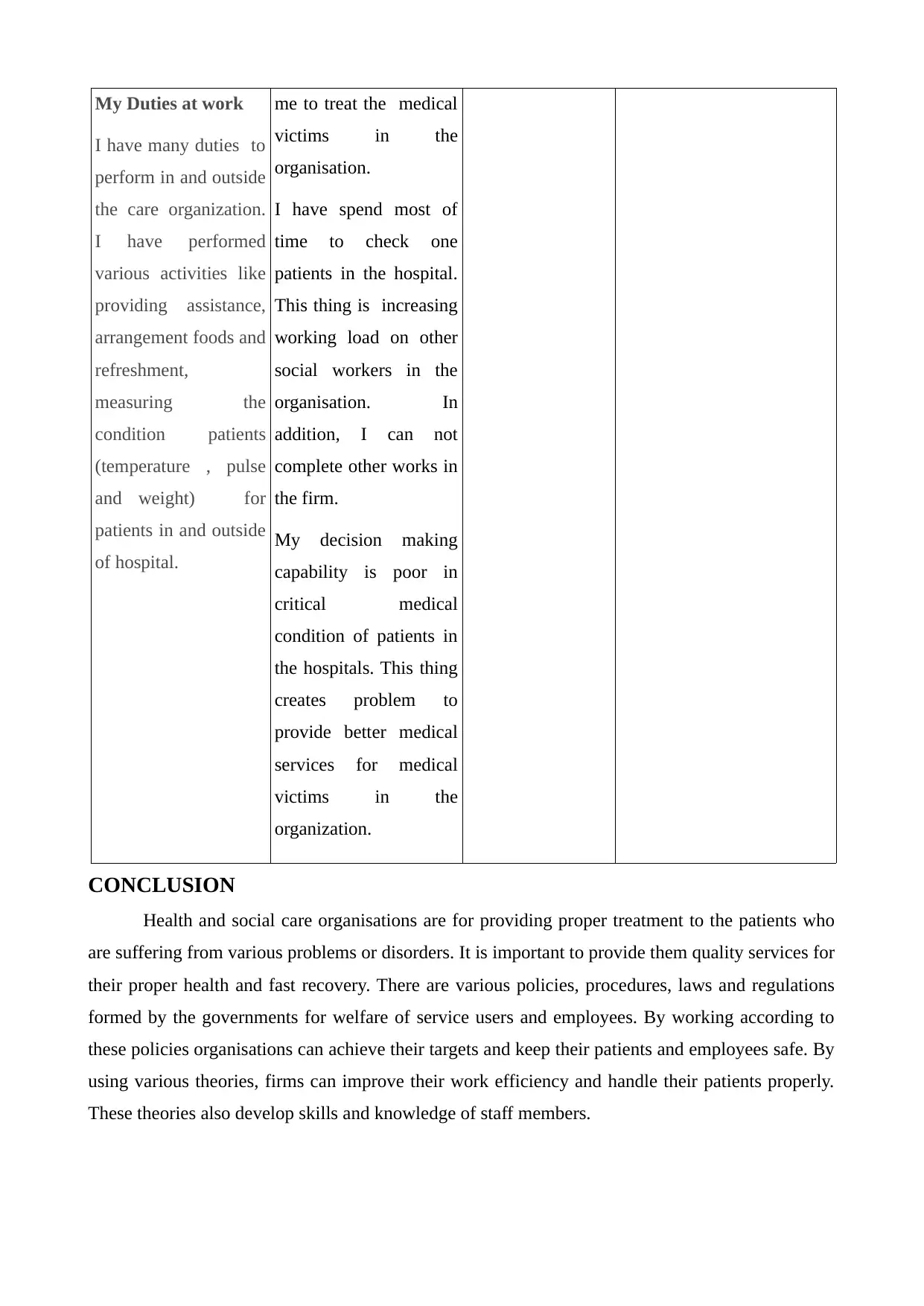
My Duties at work
I have many duties to
perform in and outside
the care organization.
I have performed
various activities like
providing assistance,
arrangement foods and
refreshment,
measuring the
condition patients
(temperature , pulse
and weight) for
patients in and outside
of hospital.
me to treat the medical
victims in the
organisation.
I have spend most of
time to check one
patients in the hospital.
This thing is increasing
working load on other
social workers in the
organisation. In
addition, I can not
complete other works in
the firm.
My decision making
capability is poor in
critical medical
condition of patients in
the hospitals. This thing
creates problem to
provide better medical
services for medical
victims in the
organization.
CONCLUSION
Health and social care organisations are for providing proper treatment to the patients who
are suffering from various problems or disorders. It is important to provide them quality services for
their proper health and fast recovery. There are various policies, procedures, laws and regulations
formed by the governments for welfare of service users and employees. By working according to
these policies organisations can achieve their targets and keep their patients and employees safe. By
using various theories, firms can improve their work efficiency and handle their patients properly.
These theories also develop skills and knowledge of staff members.
I have many duties to
perform in and outside
the care organization.
I have performed
various activities like
providing assistance,
arrangement foods and
refreshment,
measuring the
condition patients
(temperature , pulse
and weight) for
patients in and outside
of hospital.
me to treat the medical
victims in the
organisation.
I have spend most of
time to check one
patients in the hospital.
This thing is increasing
working load on other
social workers in the
organisation. In
addition, I can not
complete other works in
the firm.
My decision making
capability is poor in
critical medical
condition of patients in
the hospitals. This thing
creates problem to
provide better medical
services for medical
victims in the
organization.
CONCLUSION
Health and social care organisations are for providing proper treatment to the patients who
are suffering from various problems or disorders. It is important to provide them quality services for
their proper health and fast recovery. There are various policies, procedures, laws and regulations
formed by the governments for welfare of service users and employees. By working according to
these policies organisations can achieve their targets and keep their patients and employees safe. By
using various theories, firms can improve their work efficiency and handle their patients properly.
These theories also develop skills and knowledge of staff members.
⊘ This is a preview!⊘
Do you want full access?
Subscribe today to unlock all pages.

Trusted by 1+ million students worldwide
1 out of 14
Related Documents
Your All-in-One AI-Powered Toolkit for Academic Success.
+13062052269
info@desklib.com
Available 24*7 on WhatsApp / Email
![[object Object]](/_next/static/media/star-bottom.7253800d.svg)
Unlock your academic potential
Copyright © 2020–2026 A2Z Services. All Rights Reserved. Developed and managed by ZUCOL.





